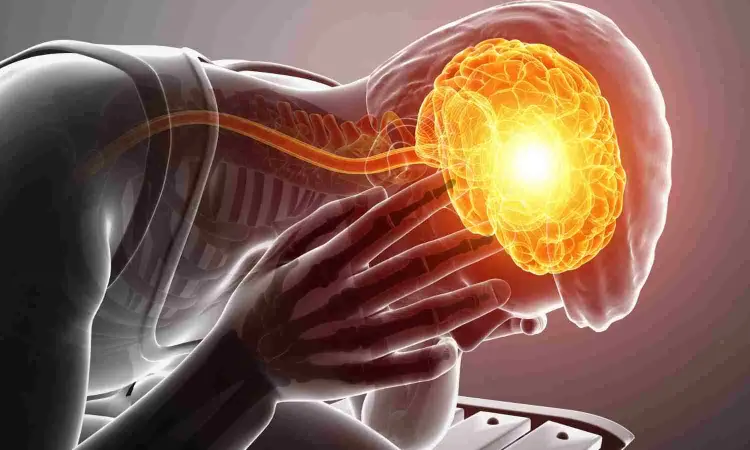- Home
- Medical news & Guidelines
- Anesthesiology
- Cardiology and CTVS
- Critical Care
- Dentistry
- Dermatology
- Diabetes and Endocrinology
- ENT
- Gastroenterology
- Medicine
- Nephrology
- Neurology
- Obstretics-Gynaecology
- Oncology
- Ophthalmology
- Orthopaedics
- Pediatrics-Neonatology
- Psychiatry
- Pulmonology
- Radiology
- Surgery
- Urology
- Laboratory Medicine
- Diet
- Nursing
- Paramedical
- Physiotherapy
- Health news
- Fact Check
- Bone Health Fact Check
- Brain Health Fact Check
- Cancer Related Fact Check
- Child Care Fact Check
- Dental and oral health fact check
- Diabetes and metabolic health fact check
- Diet and Nutrition Fact Check
- Eye and ENT Care Fact Check
- Fitness fact check
- Gut health fact check
- Heart health fact check
- Kidney health fact check
- Medical education fact check
- Men's health fact check
- Respiratory fact check
- Skin and hair care fact check
- Vaccine and Immunization fact check
- Women's health fact check
- AYUSH
- State News
- Andaman and Nicobar Islands
- Andhra Pradesh
- Arunachal Pradesh
- Assam
- Bihar
- Chandigarh
- Chattisgarh
- Dadra and Nagar Haveli
- Daman and Diu
- Delhi
- Goa
- Gujarat
- Haryana
- Himachal Pradesh
- Jammu & Kashmir
- Jharkhand
- Karnataka
- Kerala
- Ladakh
- Lakshadweep
- Madhya Pradesh
- Maharashtra
- Manipur
- Meghalaya
- Mizoram
- Nagaland
- Odisha
- Puducherry
- Punjab
- Rajasthan
- Sikkim
- Tamil Nadu
- Telangana
- Tripura
- Uttar Pradesh
- Uttrakhand
- West Bengal
- Medical Education
- Industry
Migraine surgery reduces headache days, reports Plastic and Reconstructive Surgery

For patients with chronic migraine, nerve decompression surgery effectively reduces the number of headache days-the outcome measure preferred by neurologists-along with other measures including the frequency and intensity of migraine attacks, reports a study in the June issue of Plastic and Reconstructive Surgery®, the official medical journal of the American Society of Plastic Surgeons (ASPS). The journal is published in the Lippincott portfolio by Wolters Kluwer.
"Neurologists evaluating migraine treatments tend to focus on reduction in headache days, while plastic surgeons performing headache surgery are more likely to use a measure incorporating other headache outcomes, such as the Migraine Headache Index," comments ASPS Member Surgeon and Professor of Plastic Surgery, Surgery, Neurosurgery and Neurology Jeffrey E. Janis, MD, of The Ohio State University Wexner Medical Center, Columbus. "Our study adds new evidence that headache surgery improves both sets of measures, providing a more comprehensive assessment of the results of headache surgery."
Which outcomes are improved by headache surgery?
Peripheral nerve decompression surgery-sometimes called trigger point deactivation or headache surgery – has become an established surgical treatment for chronic migraine and certain other neurological causes of headache, such as occipital and supraorbital neuralgia. Migraine surgery seeks to relieve nerve compression at trigger sites in the head and neck, which are thought to contribute to headaches.
When plastic surgeons evaluate the outcomes of headache surgery, they typically use the Migraine Headache Index (MHI), which incorporates the frequency, intensity, and duration of migraine attacks. In contrast, neurologists-"the traditional experts on nonsurgical migraine treatment"-focus on the change in monthly migraine days.
"This discrepancy is one reason why some headache specialists have been slow to recognize the growing body of evidence showing the effectiveness of headache surgery," says Dr. Janis. Current guidelines recommend against evaluating headache intensity or duration, citing a lack of standardization.
'Strong evidence in support of headache surgery efficacy'
To help bridge the gap between specialties, the researchers reviewed 19 studies of headache surgery that reported information on monthly migraine days. Performed between 2005 and 2020, the studies included a total of 1,603 patients. Five of the studies were randomized controlled trials, the highest level of research evidence.
Of eight studies assessing monthly migraine days before and after migraine surgery, six showed a significant reduction in days with migraine attacks. On weighted analysis, patients averaged 14.11 fewer migraine days per month, from before to after surgery. Based on 12 studies, total migraine attacks decreased by 8.65 days per month.
Other outcomes also improved after headache surgery, including an average reduction of 76.59 points (out of a maximum of 300 points) in total MHI score. This included improvements in migraine intensity, which decreased by an average of 3.84 points (on a 0-to-10 scale); and attack duration, which decreased by 11.80 hours per month. The studies reported no major complications of headache surgery.
The study "demonstrates the efficacy of headache surgery on the outcomes used in both the [plastic surgery] and neurology literature," Dr. Janis and coauthors conclude. They acknowledge some limitations of their study – notably including the variability in the trigger sites addressed by headache surgery. Nevertheless, the findings "provide strong evidence in support of headache surgery efficacy."
"We hope our study will help to foster common communication between plastic surgeons and neurologists in assessing the effects of headache surgery for patients with chronic headache pain," Dr. Janis comments. "Future studies of headache surgery should routinely include data on monthly migraine days, in order to better compare the outcomes of surgical and medical treatments."
Reference:
Ormseth BH, ElHawary H, Huayllani MT, Weber KD, Blake P, Janis JE. Comparing Migraine Headache Index versus Monthly Migraine Days after Headache Surgery: A Systematic Review and Meta-Analysis. Plast Reconstr Surg. 2024 Jun 1;153(6):1201e-1211e. doi: 10.1097/PRS.0000000000010800.
Dr Kamal Kant Kohli-MBBS, DTCD- a chest specialist with more than 30 years of practice and a flair for writing clinical articles, Dr Kamal Kant Kohli joined Medical Dialogues as a Chief Editor of Medical News. Besides writing articles, as an editor, he proofreads and verifies all the medical content published on Medical Dialogues including those coming from journals, studies,medical conferences,guidelines etc. Email: drkohli@medicaldialogues.in. Contact no. 011-43720751


